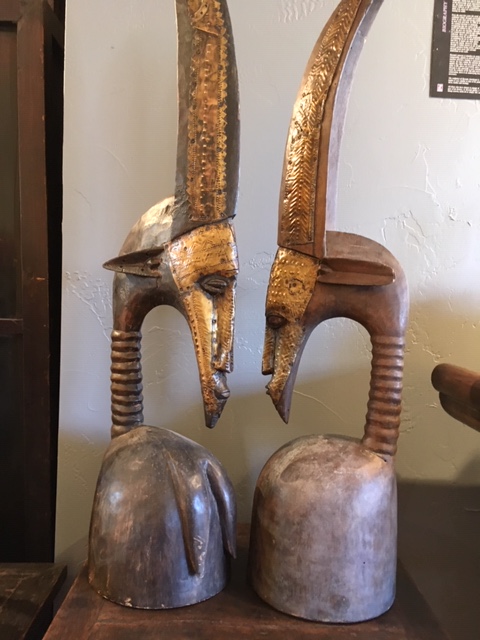Northwest Mali
Wood with dark patina, brass sheeting
The Marka, subgroup of the Mande people who live along the Niger River, use masks in ceremonies related to fishing and farming. This pair of masks portrays a combination of human and antelope features, a human face topped by the antelope horn. The masqueraders are regarded as a farming beast. Always performing in a male and female pair, the coupling of the antelope masqueraders speaks of fertility and agricultural abundance. These masks are used in ceremonies to ensure a successful hunt or a bountiful harvest. The masks are also used in circumcision ceremonies so the initiate would acquire the qualities of the agile antelope. Antelopes are revered throughout Mali as a symbol of the speed and endurance all hunters seek to attain.
The Marka use extensive brass, copper, or tin sheeting affixed to the face with small tacks or brads. This pair is fashioned with very small mouths with raised lips at the bottom of an elongated face. The nose is extremely long and elegantly thin, and the eyes are cast downward, a show of respect used in many African masks. The intricate designs on the metal sheeting are reminiscent of the scarification of the Marka hunter.
Brass and copper alloy in many old cultures denotes status and wealth. The highly valued alloy that embellishes the carvings serves two purposes: It signifies wealth, thus honoring both the dead and the living members of a family, and it deflects the harmful intentions of others and any forces of evil.
Authentic African mass and statues are rare due to climate damage and arrival of missionaries who confiscated them or destroyed them. This pair, covered with so much precious metal, is very rare and valuable. It survived with both male and female torsos displaying what could be crusty remain of sacrificial matter, creating a beautiful, aged patina.
